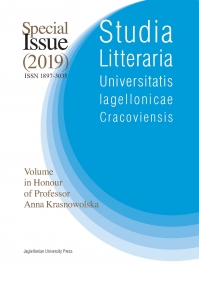Literary Heroization for the Cause of National Liberation
Literary Heroization for the Cause of National Liberation
Author(s): Roxane Haag-HiguchiSubject(s): Studies of Literature, Novel, Nationalism Studies, Interwar Period (1920 - 1939), Theory of Literature
Published by: Wydawnictwo Uniwersytetu Jagiellońskiego
Keywords: early Persian novel; heroization; nationalism;
Summary/Abstract: Moḥammad Ḥoseyn Roknzādeh-Ādamiyat’s short novel Dalirān-e tangestāni (publ. 1931/1934) relates the story of warriors from Tangestān, located in the southwestern Iranian province of Bushehr, and their fight against the British in and shortly after World War I. From the time of its publication the novel met unfavorable criticism with regard to its artistic value but was applauded for conveying patriotic spirit. This article argues that the novel is based on and structured by the idea of heroization of the local protagonists, which ultimately served the nationalist policies of the Reżā Shāh period (1925–1941). In Roknzādeh-Ādamiyat’s introduction his novel is presented as a device of remembrance: just as remembrance of history forms the basis of a nation’s coherence, its self-esteem is augmented by the recorded memory of its heroes and their deeds. The protagonists of the novel are singled out for their heroic characteristics through the elaboration of specific motifs, e.g. individual bravery and the readiness for self-sacrifice. In the process of nation building, heroes also function as a link between the individual and the community; this article isolates the characteristics that are chosen in the novel to offer a model of identification to the imagined (Iranian) reader, and demonstrates how the contextualization of the heroes makes their integrative functions more visible.
Journal: Studia Litteraria Universitatis Iagellonicae Cracoviensis
- Issue Year: 14/2019
- Issue No: Spec. Iss.
- Page Range: 75-89
- Page Count: 15
- Language: English

